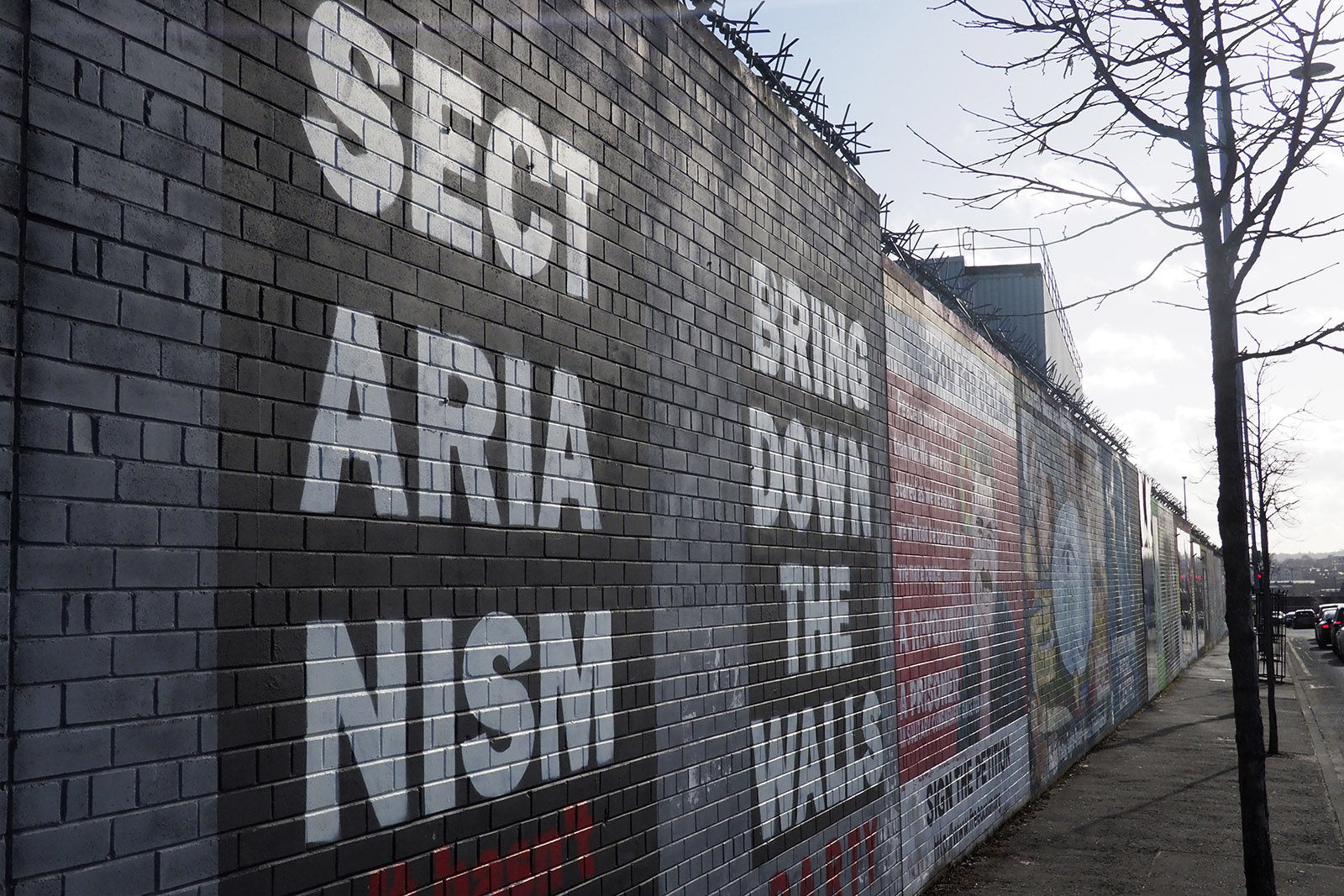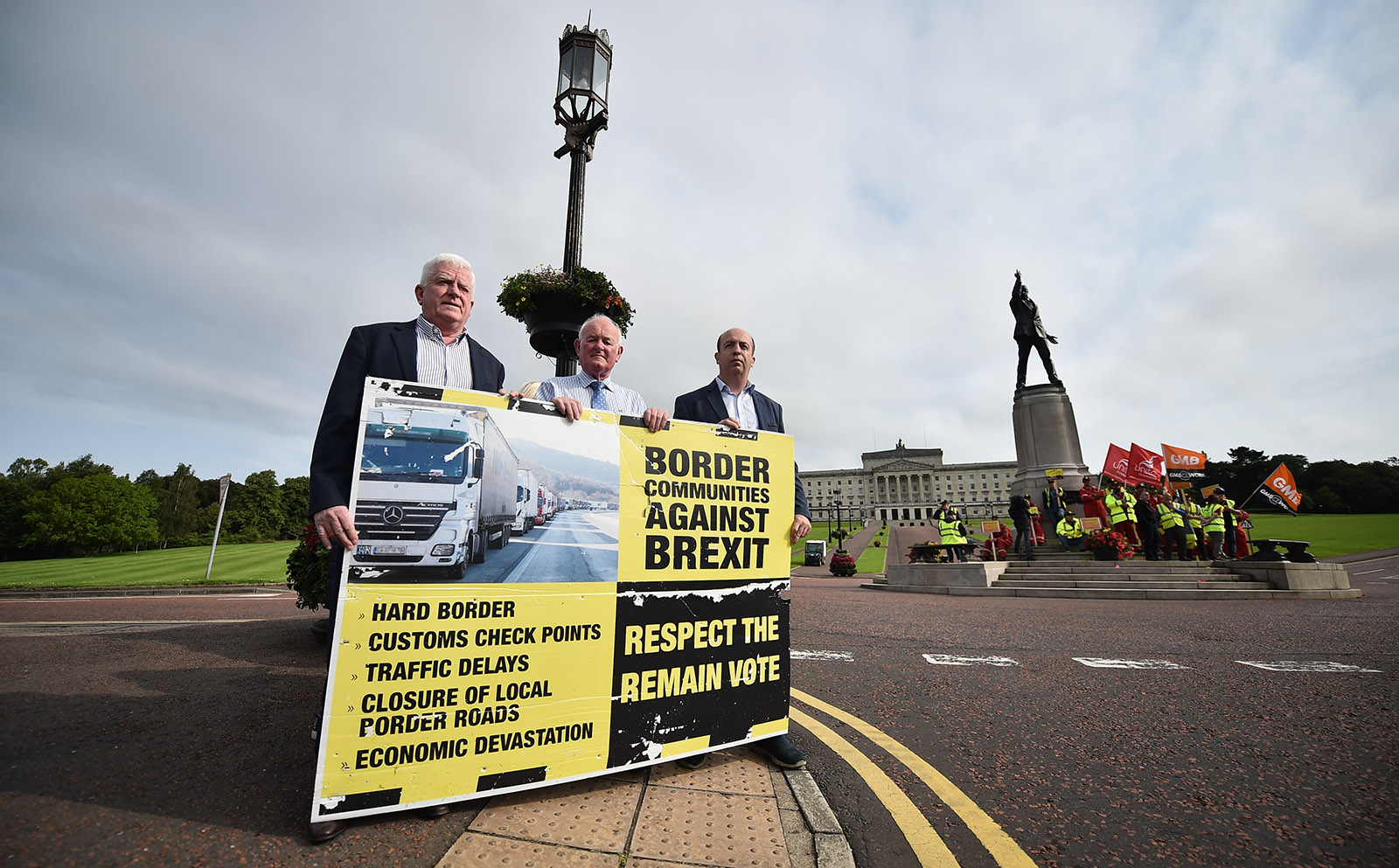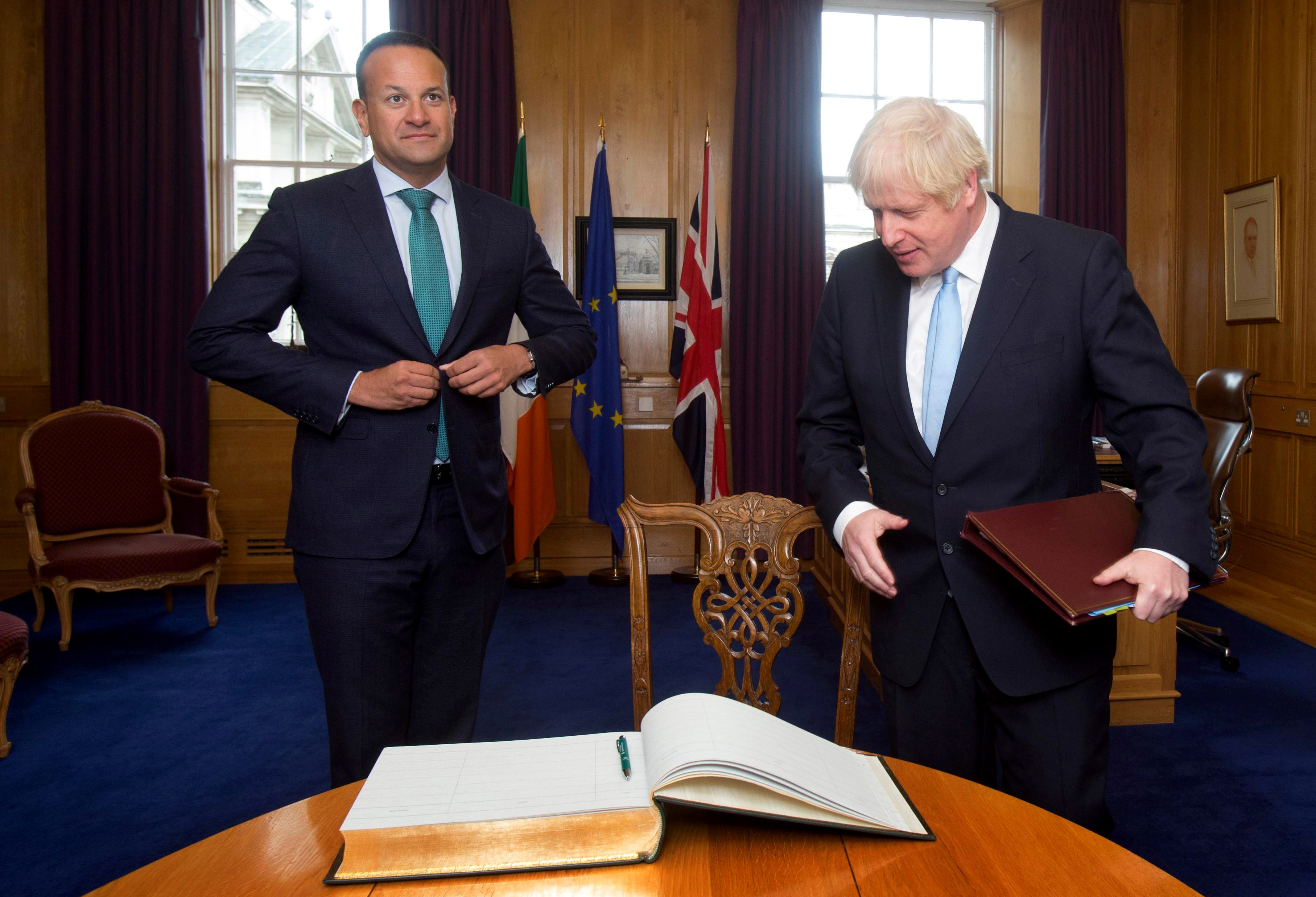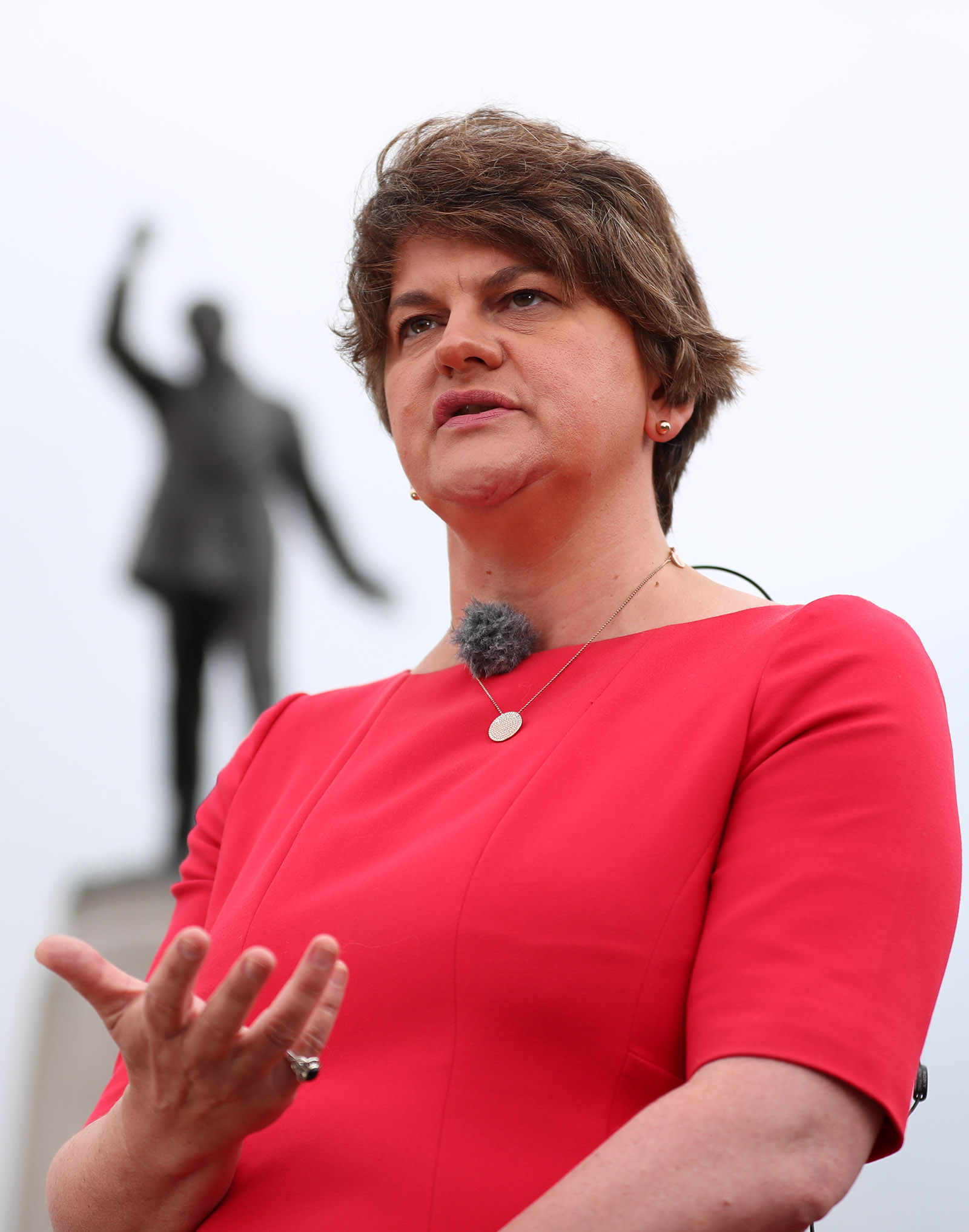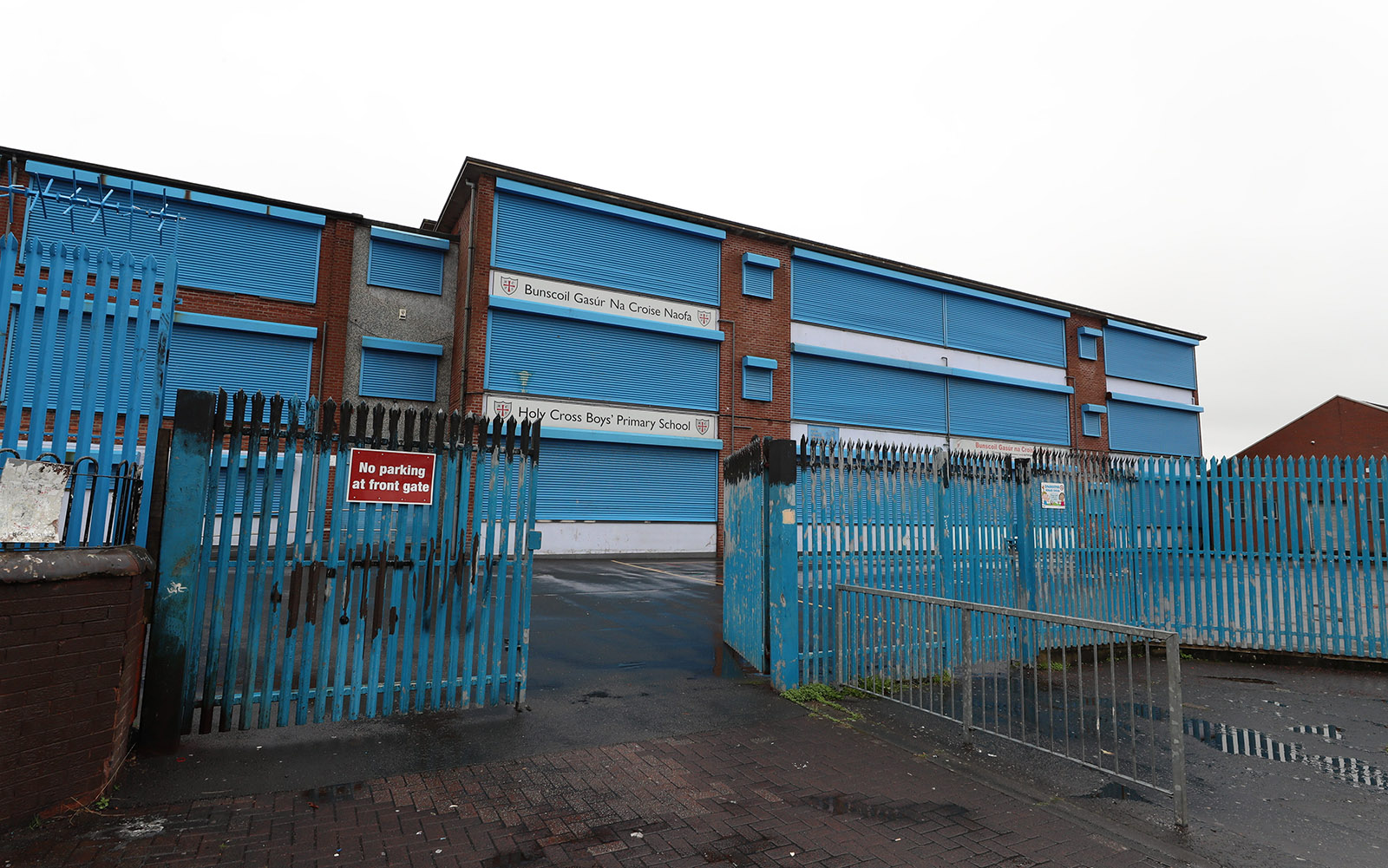The Irish have long been said to have a way with words—and there has been no shortage of them expended in the argument over the possibility of a Brexit-induced reinstatement of a border partitioning the island of Ireland. Since the 2016 referendum, numerous books have been published on the subject; thousands of newspaper articles have been written; famous Irish actors have taken to reciting poems to plea on the border’s behalf; and the border itself has a popular Twitter account, providing daily commentary—sometimes wry, sometimes raging—on the debate about its future.
More than three years into the Brexit mess, it would seem that our war of words may have finally gotten through to the British prime minister. After floating various options that could have resulted in a hard border or two soft borders, Johnson eventually settled on an over-easy variation, involving a customs border in the Irish sea, in his “great new deal.” Thanks to a procedural vote in last weekend’s “Super Saturday” sitting of Parliament, by which MPs asserted their right to debate and approve the deal line by line, Johnson’s plan didn’t, in fact, get put to a vote. Nevertheless, what the new deal demonstrated was that Britain’s prime minister had conceded in his agreement with his Irish counterpart, and thus with other EU leaders, that any kind of land border in Ireland was unacceptable.
At the time of writing, though, as the October 31 deadline looms, there has been no final agreement between London and Brussels—all deal or no deal options remain on the table. The continuing uncertainty has united a divided country in anxiety—hardly the best circumstance in which to open a debate about a radical overhaul of the sovereign status of Ireland and the nationality of its citizens. Yet that conversation is happening, and uncomfortable as it is for many, it may not easily be shut down.
In 2015, a year before the Brexit referendum, the prospect of such fundamental constitutional change in Ireland was not only rarely discussed, it had scant support. A cross-border poll conducted then showed that just 36 percent of people in the Republic of Ireland were in favor of a united Ireland in the short to medium term, and only 30 percent of those polled in the North. Compare those numbers to a recent poll that found 65 percent support in the Republic and 51 percent in the North (although support among Ulster unionists remains minuscule). These numbers represent a considerable change in attitudes toward the country’s future, making it difficult to see how the fragile status quo of partition in Ireland can be maintained for much longer, no matter the Brexit outcome.
Part of the reason for this shift is that since the Good Friday Agreement brought peace to the island twenty-one years ago, removing not just the border infrastructure but the psychological barriers that accompanied it, Irish people on both sides of the border have been able to enjoy the illusion of belonging to one country. From the all-Ireland rugby team to cross-border cooperation in trade and tourism to the huge increase in traffic back and forth, life on the island and relations between North and South had gradually normalized. (Prior to the 1998 peace agreement, many people in the South, aside from those living in border counties, never set foot in Northern Ireland.)
It’s quite probable that the people of Ireland, North and South, would have happily plodded along in this fashion, even though it required a significant papering-over of cracks beneath the surface. (While the Good Friday Agreement brought an end to the violence in the North, the issues of national identity, civil and political rights, and religious difference that lay behind the Troubles are far from resolved.) Now that Brexit is threatening to shatter the illusion entirely, reinforcing the separation of the two parts of Ireland—either by restoring a hard border in the worst scenario, or by placing the North in a customs zone apart, in the best case—people in the South are engaging with the Northern question in a way very few did during the Troubles.
Another issue that may be contributing to altered attitudes in Ireland is simple timing. In 2016, the year of the Brexit referendum, Ireland was absorbed in commemorations of the 1916 Easter Rising—the nationalist rebellion that marked the beginning of the end of British rule in most of Ireland. Leading up to that and since, a wealth of new research and numerous new books have led to a reevaluation of the founding of the Irish state and the division of the southern Republic from the North. New anniversary commemorations have been established to mark milestones in that history, such as the convening of the first Dail (Parliament) to the Government of Ireland Act, and this new national consciousness isn’t about to fade away anytime soon. As the Dublin-based historian Mary McAuliffe told me, this is having an impact on Irish thinking:
Advertisement
Going through the decade of centenaries, we’re very conscious of that moment the border was created and the breaking of the link with the United Kingdom, and all of that combined has made people start to think differently about Ireland as a country and to question it.
Evidence of contemptuous attitudes toward Ireland still held by certain quarters of the British establishment have only spurred the new all-Ireland sentiment: from Boris Johnson’s reported comment when he was foreign secretary about the Irish Taoiseach Leo Varadkar, “Why isn’t he called Murphy like the rest of them?”; to his father Stanley’s dismissal of concerns about the border, “If the Irish people want to shoot each other, they will shoot each other”; to a veiled threat from Home Secretary Priti Patel to starve the Irish into submission if we don’t comply with her government’s agenda. Such statements, combined with almost daily attacks from Britain’s pro-Brexit, right-wing press, have not inspired warm feelings toward Westminster in Ireland. At a time when a hard-won peace process is on the verge of collapse, no one in Ireland is laughing.
For these reasons, several all-island grassroots organizations such as #Think32, Shared Ireland, and Ireland’s Future are suddenly emerging, hosting well-attended conferences and other forums to discuss issues ranging from the economy to national identity, EU membership, and North–South integration. (Academics from London, Belfast, and Dublin have also established a British-led, nonpartisan working group to examine possible means for achieving Irish unification.) Sadly, there has been minimal unionist participation in these discussions, largely because of an understandable fear that the endgame would be a breakup with Britain. But as Patricia MacBride, a lawyer and political analyst from Derry, who is involved in Ireland’s Future, told me, there are a plethora of issues begging for discussion short of unification. “Brexit is not a backdoor to a united Ireland,” she said. “Brexit has kicked the door down and made people look in and see what’s there, and what’s possible.”
The problem is that when one does look behind the door, what one sees isn’t immediately encouraging. Northern Ireland recently marked its thousandth day without a government. Power-sharing at the devolved assembly based at Stormont Castle in Belfast collapsed in January 2017, ostensibly over a scandal concerning public funds for a renewable heating project that involved the Democratic Unionist Party (DUP) leader Arlene Foster, and over the insistence of the nationalist party Sinn Fein on an Irish language act. But this conflict had been long in the making, and its roots lay not in these specific disputes but in the structure of the power-sharing arrangement itself.
After the Good Friday Agreement went into effect, the moderate parties that had been vital players in bringing it about—the Ulster Unionist Party (UUP) on the unionist side and Social Democratic and Labour Party (SDLP) on the nationalist side—found themselves marginalized, while the hardliners in each camp were empowered. The most dismaying aspect of post-GFA Northern Ireland has been how the more intransigent parties, Sinn Fein and the DUP, both of which initially resisted the peace process, have played on lingering tensions in their respective communities to win votes; in consequence, it was their leaders who took precedence in the devolved government power-sharing executive. This arrangement worked satisfactorily as long as Sinn Fein’s Martin McGuinness and the DUP’s Ian Paisley (and later Peter Robinson) were running the show, but whatever goodwill there was between the opposing factions has largely evaporated with their departures.
The consequence of this breakdown in devolved government is that at this most crucial juncture in Northern Ireland’s recent history, a majority of the population has no effective representation. Sinn Fein has continued its longstanding policy of refusing to take up the seats it wins in the Westminster Parliament, so the only voice speaking on behalf of the people in the all-important Brexit negotiations is the DUP’s. This imbalance has only been exacerbated by a quirk of the election result in 2017, which left the Conservative government (first, under Theresa May’s leadership; now, under Boris Johnson’s) depending for its parliamentary majority on an alliance with the MPs from this right-wing, fundamentalist-Protestant party from Northern Ireland.
Advertisement
The DUP’s views do not even accord with a large part of the unionist community. When I spoke recently with John Kyle, a member of the Belfast City Council and a former interim leader of the Progressive Unionist Party, he told me that unionists are much “more heterogeneous than one would think, listening to the DUP.” And while a majority of unionists favor Brexit and see their natural home within the UK, rather than inside the EU, he agreed that there is a substantial minority deeply opposed to it.
Since the referendum, there has, in fact, been a surprising surge in Irish passport applications from Northern Ireland Protestants. (Under the Good Friday Agreement’s provisions, which created a certain degree of shared sovereignty, anyone born in Northern Ireland is entitled to hold either an Irish or a British passport, or both.) The sudden flurry of applications has more to do with retaining eligibility for various EU programs and maintaining easy access to holidays in Spain than with any new-found fervor for an Irish identity, but it does demonstrate that while many unionists recoil at the idea of the North’s joining the rest of Ireland, they’re willing to make this compromise to their “Irishness” in order not to lose their EU citizenship.
For his part, Kyle argues that the so-called backstop, the hotly disputed Brexit arrangement by which Northern Ireland would remain in the EU, would have been the best of various bad alternatives for many unionists, despite causing some divergence in the North’s status from the rest of the UK. “Not a majority, but a substantial minority [of unionists] would see that as a price worth paying,” he said, “for the economic benefits and the stability it would bring to the constitutional question.”
Naturally, the Northern Irish backstop, though acceptable to Northern nationalists and to the Republic because it would have settled the border question, was flatly rejected by the DUP. (The DUP also rejected both Boris Johnson’s deal and Theresa May’s earlier one, continuing to insist on a solution that involves no divergence of status from the rest of the UK, even as it claims to oppose the restoration of a border in Ireland—a position that most impartial observers regard as embodying an impossible contradiction.) Meanwhile, tensions between nationalist and unionist communities in the North are deepening.
Despite the great strides the region has made in securing an embedded peace, people from different communities live largely parallel lives, following their own sports, their own religion, and their own politics. In other words, nationalists and unionists have got on with co-existence, but there’s no love lost between them. Tony Macaulay, an author of several books about growing up during the Troubles, who has worked in peacebuilding and community development in several post-conflict societies, including his native Belfast and Rwanda, is far from sanguine. “In Rwanda, after a genocide where a million people died, there’s a level of forgiveness and reconciliation taking place that is far beyond what we’ve achieved in Northern Ireland,” he told me. Indeed, although the infrastructure of the Troubles has long been dismantled, and British soldiers no longer patrol the streets, miles of so-called peace walls remain in place, primarily in the cities of Belfast and Derry. These security barriers are found predominantly in working-class areas, perpetuating the segregation of the most socially deprived segment of each community, nationalist and unionist, from each other.
This situation does not reflect well on the two main political parties, Sinn Fein and the DUP, which have not only done little to advance the healing process, but have also exacerbated tensions by their own failure to work together. The fact that Northern Ireland is somehow managing to tick along despite lacking its own democratically elected government for nearly three years is a testament to the resilience of the people there—many of whom, after all, survived three decades of war—as well as an effective civil service. But the rift is beginning to show. While civil servants can keep the day-to-day operations running, big strategic decisions involving, for example, healthcare, education, and infrastructure have been put on hold. And the precariousness and dysfunction of this situation predates whatever destabilizing effects Brexit itself may inflict on Northern Ireland.
The state of public education is especially concerning. The system remains deeply segregated, with only 7 percent of children attending integrated schools, a position virtually guaranteeing that the intercommunal alienation will roll over into the next generation. Healthcare, too, desperately needs an overhaul, with staff shortages and waiting lists for treatment that are considerably worse than elsewhere in the UK. Northern Ireland also lags behind both the Republic of Ireland and Britain on women’s reproductive rights, and it has the lowest level of expenditure on mental health services of any region in the UK—a deficit all the more glaring since more people in the North have died by suicide in the two decades since the GFA than were killed in the preceding three decades of violence during the Troubles. Add to all this the North’s struggling economy, which performs well below that of the comparatively thriving Republic, and it’s easy to see why uncertainty over Brexit’s border question is having a destabilizing effect.
Aside from that, Brexit has brought to light other issues of Irish and European identity that demand urgent attention. A recent immigration tribunal decision with far-reaching consequences has just found that Northern Irish citizens who hold Irish passports and identify as Irish will have to renounce their “automatic” British citizenship in order to exercise their rights as citizens of the European Union. With the Brexit deadline in view, this ruling—though still subject to appeal—appears to have decided a crucial area of the Good Friday Agreement’s constructive ambiguity in favor of a unionist interpretation of the law, and against Irish interests.
A related dilemma involves the increased number of Irish passport-holders living in the North. As unionists’ applications for Irish passports increase—trends suggest there will soon be a majority of Irish passport-holders in Northern Ireland, if there isn’t already—after Brexit there will be a large number of EU citizens living in what will likely be non-EU territory. In other words, this will create an entire new class of EU citizens who will not have full access to their EU rights. Another complicating factor is that the Irish government may have to assume greater responsibility for these Irish (and EU) citizens living on non-EU soil. Already the Dublin government has pledged to cover the costs (estimated at 4 million euros per year) of the European Health Insurance Card for Irish citizens living in the North. (This is a permit that guarantees EU citizens access to state-funded healthcare while traveling in other EU countries.) However the border question is eventually settled, no doubt many other similar EU-related issues will emerge that have not yet been considered.
Then there’s the economy. In 2015, a group of academics from the US, Switzerland, and Canada compiled a report titled “Modeling Irish Unification,” examining what would be the likely economic effects of a newly-formed, thirty-two-county Ireland. The first such simulation of its kind, the report predicted that the struggling North, the weakest link in the UK economy, would benefit enormously from joining forces with the South, which would in turn see some modest gains. All told, the study found, reunification could deliver a 31.2 billion euro boost to the all-island GDP in the first eight years. Despite its overwhelmingly positive conclusions, the report received relatively little attention. Before Brexit, it was understandable that the findings of what then seemed an entirely hypothetical scenario would be largely ignored. But now, with both the Northern and Southern economies due to take a significant hit because of Brexit, this alternative prospectus has acquired a new pertinency.
When, in recent years, Ireland was weighing significant constitutional reforms—including one addressing the extremely vexed issue of whether to repeal the amendment that effectively banned abortion—it resorted to a process of consultation and deliberation through Citizens’ Assemblies. This system, in which a representative group of ordinary citizens convened to work through divisive issues under the guidance of policy experts, took democratic decision-making out of party politics and into a new realm of popular sovereignty. The practice came to be regarded as such a success that some British politicians even took to advocating it as a way to break the desperate political impasse and growing tribalism over Brexit.
Although there has been no formal discussion about this, there are signs that the groundwork is being laid for a Citizens’ Assembly–style solution to help resolve the Brexit-created crisis over the border question and the still-larger issues of sovereignty, identity, and unification on the island of Ireland. If such a process were to emerge, it seems likely that every effort would be made to encourage unionist participation and address the concerns of that community.
Comments from the Irish Taoiseach that a new Ireland would require a new constitution reflecting a broader identity are promising. Of course, unionists may simply want none of it, in which case a toxic cycle will continue for another generation, with a growing risk that the delicate compromises of the Good Friday Agreement will break down and a resurgence of sectarian violence may ensue. But there is reason to hope that at least some on both sides of the Northern divide would be willing to engage. The Irish gift for talk could hardly find a better purpose.


